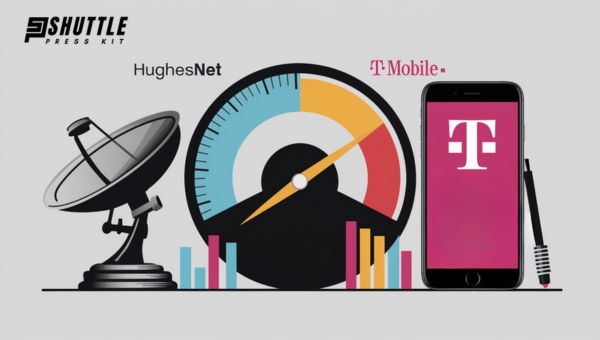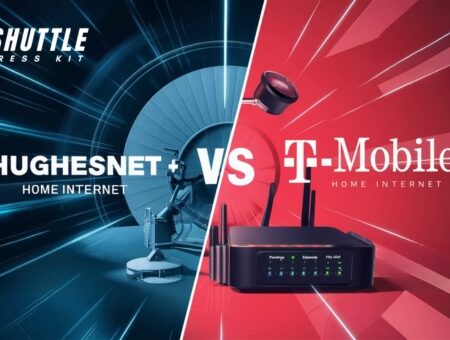When you are choosing the internet for your home, finding the best deal with reliable service can be hard. “Hughesnet vs. T-Mobile Home Internet” is a question many people ask these days. Both companies offer different benefits and features, but which one should you pick?
In this blog post, I will compare Hughesnet and T-Mobile Home Internet to help you decide which one suits your needs the best. Stick around to find out if satellite or 5G home internet is the right choice for you!
| Feature | HughesNet | T-Mobile |
|---|---|---|
| Internet Type | Satellite | 5G Wireless |
| Maximum Download Speed | Up to 100 Mbps | Up to 245 Mbps |
| Pricing | $49.99 – $94.99 per month (24-month contract) | $50.00 – $70.00 per month (no contract) |
| Upload Speed | Up to 3 Mbps | Up to 20 Mbps |
| Data Caps | Soft data caps (15 GB to 200 GB) | Unlimited data |
| Latency | High latency (600 ms or more) | Low latency (generally 20-30 ms) |
| Availability | Nationwide, including rural areas | Nationwide, with some rural limitations |
| Contracts | 24-month contract required | No contracts required |
| Customer Satisfaction | Mixed reviews, lower satisfaction scores | Generally higher ratings |
| Best For | Users in remote areas with no other options | Users needing high-speed internet without contracts |
Hughesnet vs. T-Mobile – A Quick Overview
When comparing Hughesnet vs. T-Mobile for home internet, there are several key points to consider. Hughesnet, a satellite-based service, provides wide coverage, especially in rural areas. It is an ideal option for those with limited access to traditional wired internet.

However, it has higher latency and data caps. T-Mobile Home Internet, on the other hand, utilizes a 5G network for faster, more reliable speeds.
It’s known for lower latency and unlimited data, making it great for streaming and gaming. However, its coverage may be limited in remote regions. Assessing your location and usage needs will help determine the optimal choice.
Price
When comparing price between HughesNet and T-Mobile, both providers offer competitive options, but their pricing structures differ significantly. HughesNet’s plans range from $49.99 to $94.99 per month, with a two-year contract requirement and additional equipment fees.
After the first year, prices typically increase, which can lead to higher long-term costs. In contrast, T-Mobile’s 5G Home Internet plans are priced at approximately $50 to $70 per month, with no contracts or hidden fees, making it a more straightforward and potentially cost-effective choice for users.
The absence of contracts with T-Mobile allows for greater flexibility, appealing to those wary of long-term commitments.
Speed
In terms of speed, T-Mobile generally outperforms HughesNet. T-Mobile’s 5G Home Internet offers download speeds between 72 and 245 Mbps, making it suitable for high-bandwidth activities like streaming and gaming.
HughesNet, on the other hand, provides speeds ranging from 50 to 100 Mbps, which may be adequate for basic browsing but can be limiting for more demanding users.
Additionally, T-Mobile’s low latency enhances the overall user experience, especially for real-time applications. While HughesNet has made improvements in speed, T-Mobile’s 5G technology typically delivers faster and more reliable connections.
Reliability
Reliability is another critical factor when evaluating HughesNet and T-Mobile. HughesNet, as a satellite provider, can experience latency and service interruptions due to weather conditions and geographical limitations, which may affect performance in certain areas.
Conversely, T-Mobile’s 5G network is designed to provide more stable connections, particularly in urban and suburban environments.
However, T-Mobile’s service may face limitations in very rural areas where 5G coverage is less robust. Overall, T-Mobile tends to offer a more reliable internet experience, especially in regions with good 5G infrastructure.
Coverage
When it comes to coverage, HughesNet has a significant advantage due to its satellite technology, which allows it to reach virtually all areas of the United States, including remote and rural locations.
This extensive coverage makes HughesNet a suitable option for users in underserved areas where other internet services may not be available.
T-Mobile also provides wide coverage, particularly in urban and suburban areas, but its 5G service may not be as accessible in very rural regions. While both providers offer substantial coverage, HughesNet is often the go-to choice for those in hard-to-reach locations.
Also Read: How to Reboot Your Starlink Internet?
FAQs
What is the major difference between HughesNet and T-Mobile Home Internet?
HughesNet provides satellite internet, making it a good choice for rural areas, while T-Mobile Home Internet uses a 4G LTE or 5G network, offering faster speeds in areas with strong cellular coverage.
Can I use HughesNet or T-Mobile Home Internet for streaming?
Yes, both services support streaming. However, T-Mobile Home Internet might offer a better experience with less latency and higher data caps compared to HughesNet.
Is installation required for both services?
Yes, HughesNet requires a professional installation of a satellite dish, while T-Mobile Home Internet involves a simpler setup with a gateway device you can install yourself.
How reliable are HughesNet and T-Mobile Home Internet?
HughesNet’s satellite service can be affected by severe weather, but it’s available nationwide. T-Mobile Home Internet’s reliability largely depends on the local cellular network’s performance and may vary by location.
Also Read: How Much Does Starlink Internet Costs?
Conclusion
In the competition between HughesNet and T-Mobile Home Internet, the choice hinges on your specific needs and location.
HughesNet, a satellite-based service, offers widespread coverage, making it a viable option for rural areas where traditional broadband is not available. However, its data caps and slower speeds may be a drawback for heavy internet users.
On the other hand, T-Mobile Home Internet utilizes a growing 5G network to provide faster speeds and unlimited data, making it an appealing choice for households with high internet usage.
